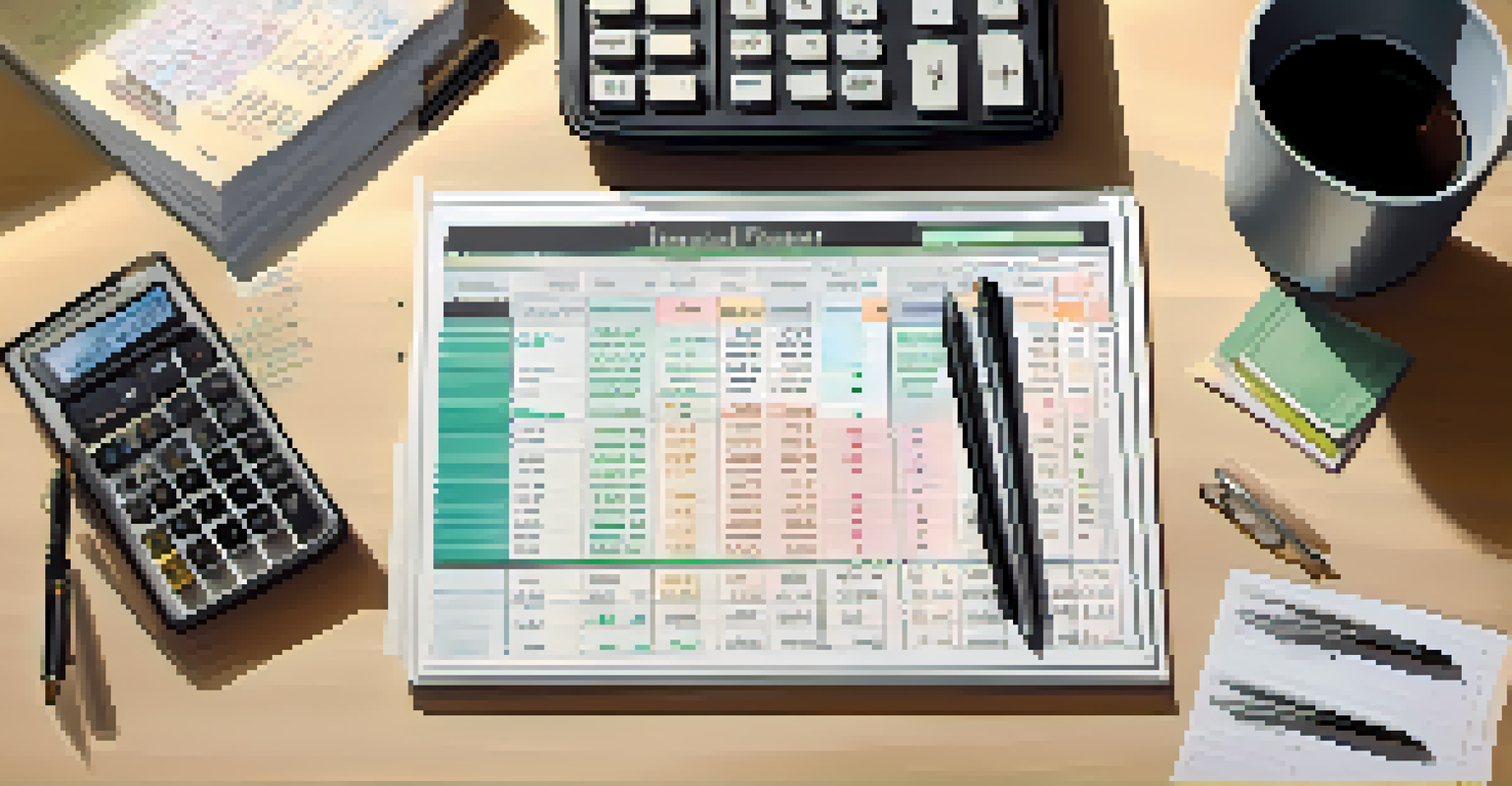Tips for Budgeting for Your First Mortgage Payment

Understand Your Total Monthly Housing Costs
Before diving into budgeting, it's crucial to understand what your total monthly housing costs will be. This includes not just your mortgage payment, but also property taxes, homeowner's insurance, and possibly private mortgage insurance (PMI). All these elements add up, and knowing the full picture helps you plan better.
A budget is telling your money where to go instead of wondering where it went.
For example, if your mortgage payment is $1,200 but property taxes and insurance add another $300, you should budget for $1,500 in total monthly costs. This way, you're not left surprised when bills start rolling in. It's like planning a trip; you don’t just account for gas but also food, lodging, and activities.
By grasping your total housing costs from the get-go, you'll be setting a realistic budget that can accommodate all your payment obligations, helping you avoid financial strain.
Create a Detailed Monthly Budget
Now that you know your total costs, it’s time to create a detailed monthly budget. Start by listing all your income sources, followed by your fixed expenses like utilities, groceries, and transportation. This will give you a clear picture of your financial landscape and how much you can allocate towards your mortgage.

Think of your budget as a roadmap for your finances. Just as you wouldn’t drive without a map, you shouldn’t navigate your finances without a clear plan. By identifying areas where you can cut back, you might find extra room for your mortgage payment.
Know Your Total Housing Costs
Understanding all components of your monthly housing costs, including mortgage, taxes, and insurance, is essential for effective budgeting.
Once you have your budget laid out, revisit it regularly—especially during the first few months of homeownership. This will ensure you stay on track and can adjust for any unexpected costs.
Set Up an Emergency Fund for Unexpected Expenses
Homeownership often comes with unexpected expenses, from emergency repairs to rising utility bills. Setting up an emergency fund can provide peace of mind and financial stability when these surprises come knocking. Aim to save at least three to six months' worth of living expenses, which includes your mortgage payment.
An investment in knowledge pays the best interest.
Imagine your home as a car; regular maintenance is essential, and sometimes, unexpected repairs will pop up. Just like you wouldn’t drive without a spare tire, you shouldn’t manage a mortgage without an emergency fund. This cushion will help you handle those surprise costs without derailing your budget.
Regularly contribute to this fund, even if it’s a small amount each month. Over time, your emergency fund will grow, making you feel more secure in your new home.
Consider All Your Financing Options
When budgeting for your first mortgage payment, it’s essential to explore various financing options. Different mortgage types, such as fixed-rate or adjustable-rate mortgages, can greatly impact your monthly payment and overall budget. Take the time to research and compare rates to find the best fit for your financial situation.
For instance, a fixed-rate mortgage offers stability, ensuring your payment remains the same for the life of the loan, while an adjustable-rate mortgage may start lower but can fluctuate over time. It's crucial to weigh the pros and cons of each type to avoid future financial stress.
Create and Adjust Your Budget
Building a detailed budget and regularly tracking your spending helps ensure you stay on top of your financial commitments.
Consulting with a mortgage advisor can also be beneficial. They can explain the nuances of different loans and help you find a solution that aligns with your budget.
Factor in Homeowners Association Fees
If you're buying a property within a community or a condo, homeowners association (HOA) fees can significantly impact your budget. These fees cover shared amenities and maintenance, and they can vary widely. Make sure to factor these fees into your overall monthly housing costs to avoid any surprises.
Think of HOA fees as a subscription to your community's upkeep and amenities. Just as you wouldn’t forget to budget for a gym membership, don’t overlook these fees. They can sometimes be a few hundred dollars a month, so including them in your budgeting will lead to a more accurate financial plan.
Before purchasing, review the HOA rules and fees to understand what you’re committing to. This information will help you make informed decisions about your home investment.
Track Your Spending and Adjust as Needed
Once you've set a budget and started making mortgage payments, tracking your spending becomes crucial. Use budgeting apps or a simple spreadsheet to monitor where your money goes each month. This will help you identify patterns and areas where you might need to cut back.
For instance, if you notice you're spending more on dining out than anticipated, you can adjust your budget accordingly. It's like adjusting the sails of a boat; small changes can lead to a smoother journey. Staying on top of your spending will also help you ensure that your mortgage payment is always manageable.
Establish an Emergency Fund
Setting aside funds for unexpected expenses provides financial security and peace of mind in homeownership.
Don’t be afraid to adjust your budget as life changes. Whether you get a raise or face unexpected expenses, being flexible will keep your finances in line with your goals.
Seek Professional Financial Advice if Needed
Sometimes, navigating the financial side of homeownership can be overwhelming. Seeking professional financial advice can provide clarity and guidance tailored to your situation. A financial advisor can help you create a comprehensive plan that accounts for all aspects of your finances.
Imagine trying to solve a complicated puzzle without the picture on the box. A financial advisor can help you see the bigger picture, guiding you through budgeting for your mortgage while considering other financial goals like retirement savings or paying off debt.

Don’t hesitate to reach out for help. Investing in professional advice can be a smart move that pays off in the long run, ensuring your first mortgage payment is just the beginning of a successful homeownership journey.